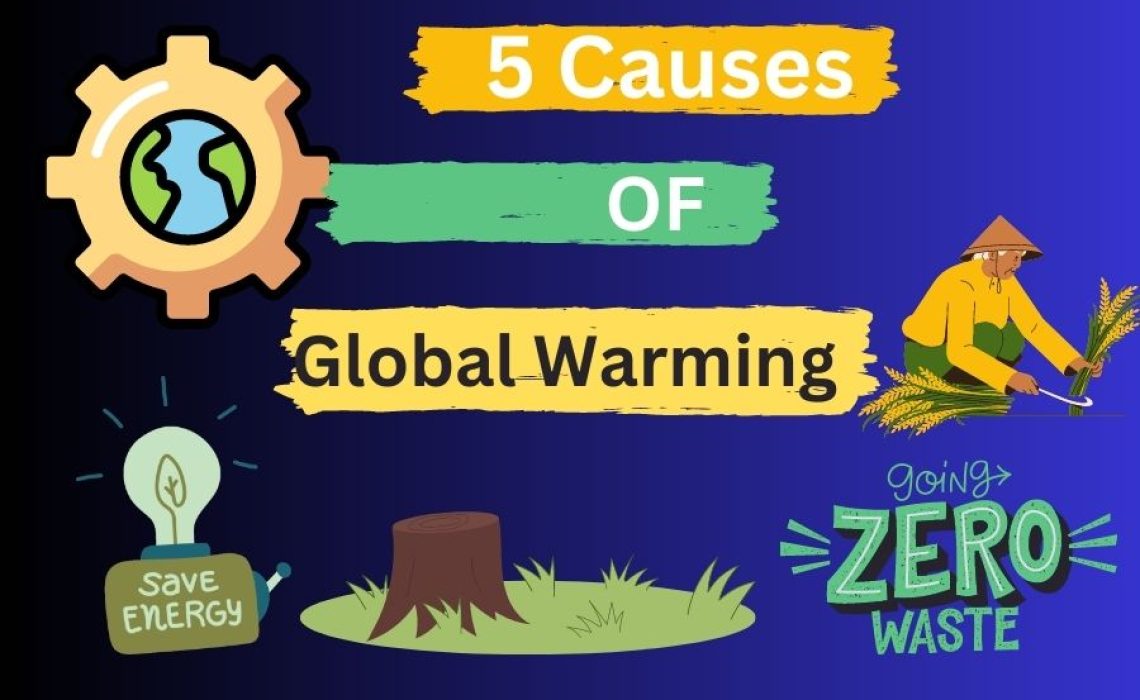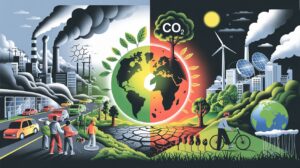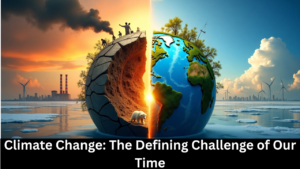Global warming, a complex yet urgent issue, has triggered alarm bells worldwide. The relentless increase in Earth’s average surface temperature, primarily driven by human activities, demands our attention. In this blog post, we delve into the top 5 causes of global warming, shedding light on the factors that fuel this perilous phenomenon. Equipped with knowledge, we can tackle the problem head-on and strive for a sustainable future.
Table of Contents
ToggleWhat is a Global Warming?
There has been an increase of about 2 degrees Fahrenheit (about 1 degree Celsius) in the average yearly temperature of the Earth since the beginning of the Industrial Revolution. From 1880, when accurate recordkeeping commenced, until 1980, the average temperature increased by 0.07 degrees Celsius (0.13 degrees Fahrenheit) per decade. However, since 1981, the rate of increase has more than doubled, with the past 40 years experiencing a rise of 0.18 degrees Celsius or 0.32 degrees Fahrenheit per decade.
What’s the outcome? A planet hotter than ever before. Nine out of the 10 warmest years since 1880 have taken place since 2005, and the five highest temperature years on record all occurred after 2015. Climate change sceptics have posited a “pause” or “slowdown” in global temperature increases, but numerous studies, including a 2018 paper in Environmental Research Letters, have debunked this notion. Global warming impacts are already affecting people worldwide.
Climate scientists now assert that we must cap global warming at 1.5 degrees Celsius by 2040 to evade a future characterized by its most extreme and devastating effects, including severe droughts, wildfires, floods, tropical storms, and other catastrophes collectively known as climate change. Although these consequences touch everyone in some way, underprivileged individuals, the economically marginalized, and people of colour bear the brunt of their impacts, as climate change often exacerbates poverty, displacement, hunger, and social unrest for these groups.
List of 5 Causes of Global Warming
- Burning of Fossil Fuels
- Deforestation
- Industrial Processes
- Agriculture and Livestock Farming
- Landfills and Waste Management
Unravelling the Culprits: 5 Leading Causes of Global Warming
- Burning of Fossil Fuels: Coal, oil, and natural gas – the bedrock of modern society. Alas, their combustion releases vast amounts of carbon dioxide (CO2), a potent greenhouse gas. Power plants, vehicles, and industries consume these energy sources voraciously, exacerbating the greenhouse effect and propelling global warming.
- Deforestation: Forests, the Earth’s lungs, absorb CO2 and emit oxygen. However, deforestation, driven by agriculture, logging, and urbanization, strips the planet of these vital carbon sinks. Furthermore, the burning and decomposition of felled trees release stored CO2 back into the atmosphere, accelerating global warming.
- Industrial Processes: Our modern way of life relies heavily on industry. Yet, the manufacturing of cement, steel, aluminium, and chemicals introduces vast quantities of greenhouse gases, including CO2 and methane (CH4), into the atmosphere. These emissions, coupled with energy consumption for operations, contribute significantly to global warming.
- Agriculture and Livestock Farming: The agriculture sector, essential for food production, also plays a part in global warming. Agricultural practices, such as rice cultivation and livestock farming, emit methane and nitrous oxide (N2O), two potent greenhouse gases. Moreover, deforestation for cropland expansion exacerbates the problem.
- Landfills and Waste Management: Waste, an inevitable byproduct of human activity, contributes to global warming too. Landfills emit methane as organic waste decomposes anaerobically. Furthermore, waste incineration releases CO2, while poor waste management practices heighten the risk of wildfires, which emit additional greenhouse gases.
Conclusion: Causes of Global Warming
Global warming, a multifaceted issue, stems from a variety of human activities. By understanding the top five causes of global warming – burning fossil fuels, deforestation, industrial processes, agriculture, and waste management – we can take informed action to mitigate their impact. Let’s work together to curb global warming and protect our planet for generations to come.
Read This Article: What Are Five Threats to Biodiversity?
What are the other effects of Global Warming?
As we continue to discover more about the ramifications of global warming, it becomes increasingly evident how its devastating effects on people and the planet are escalating. The escalating frequency and intensity of heatwaves, droughts, and floods, attributed to climate change, lead to community suffering and rising death tolls. Failure to reduce emissions could result in the annual loss of over 250,000 lives worldwide and plunge 100 million individuals into poverty by 2030.
Global warming’s impact on the United States is already significant, and without effective emission control, the following consequences are anticipated:
- The disappearance of glaciers, premature snowmelt, and extreme droughts will exacerbate water scarcity and elevate wildfire risks in the American West.
- Rising sea levels will intensify coastal flooding along the Eastern Seaboard, particularly in Florida and other areas like the Gulf of Mexico.
- Forests, farms, and urban areas will grapple with new pests, heatwaves, torrential rainfall, and heightened flood risks, potentially damaging or destroying agriculture and fisheries.
- Habitat disruption, including coral reefs and alpine meadows, could push numerous plant and animal species towards extinction.
- Increased ragweed pollen growth, air pollution, and conditions conducive to pathogens and mosquitoes will likely lead to a higher prevalence of allergies, asthma, and infectious disease outbreaks.
Although climate change affects everyone, certain groups bear a disproportionate burden. Indigenous people, people of colour, and economically disadvantaged communities are often the hardest hit. Existing inequalities in housing, healthcare, and labour systems render these communities more susceptible to the severe impacts of climate change, despite their minimal contribution to the issue.
Is the Problem of Global Warming too big for me to Help Solve?
Global warming, a colossal and intricate challenge, might feel insurmountable for an individual. However, don’t be disheartened! Small actions, when combined with collective efforts, can make a tangible difference. Here’s how you can pitch in:
- Curtail energy usage: Be conscious of your energy consumption. Turn off idle appliances, and invest in energy-efficient devices.
- Embrace renewables: Opt for solar or wind power, and rally your community to support clean energy.
- Rethink transportation: Carpool, take public transit, walk or bike. If a car is a necessity, consider fuel-efficient, hybrid, or electric models.
- Insulate your home: Ensure proper insulation to cut heating and cooling costs, and utilize energy-efficient systems.
- Save water: Use water-saving appliances, repair leaks, and adopt water-conserving habits.
- Reduce, reuse, recycle: Cut down waste by minimizing single-use items, reusing when feasible, and recycling properly.
- Shop sustainably: Choose products from eco-friendly companies, and support local, organic agriculture.
- Share knowledge: Learn about global warming, encourage others to act, and back policies that address the issue.
- Engage: Join environmental initiatives, advocate for eco-friendly policies, or participate in local groups.
- Offset emissions: Support projects that plant trees or invest in green technologies.
Although one person can’t solve global warming single-handedly, collective action leads to substantial change. By consciously choosing eco-friendly options and inspiring others, you’ll contribute to the fight against global warming and help safeguard our planet for generations to come.
Final Thought
Finally, it is critical to recognize the importance of global warming and climate change as pressing issues confronting humanity. People, communities, and nations may work together to reduce carbon footprints, embrace eco-friendly habits, and promote renewable energy. We can conserve the Earth for future generations by working together to create a more fair world for all. Remember that even modest actions have an impact; so, stay informed, involved, and committed to developing a sustainable future.






